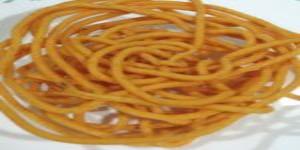
Scope
Thenkuzhal Murukku is a popular savory snack usually made for festivals especially for Diwali and Krishna Jayanthi. It’s a crispy and tasty snack made using rice flour and urad dal flour.
Murukku derives from the Tamil word for “twisted”, which refers to its shape. Murukku is typically made from rice flour and urad dal flour. Murukku is especially popular in the states of Karnataka (where it is called chakli), Tamil Nadu,
Kerala, Andhra Pradesh. It is also popular in countries with substantial presence of Indian and Sri Lankan diaspora, including Singapore, Fiji, and Malaysia.
Scope
Murukku is typically made from rice and urad dal flour. The flours are mixed with water, salt, chilli powder, asafoetida and either sesame seeds or cumin seeds. The mix is kneaded into a dough, which is shaped into spiral or coil shapes either by hand or extruded using a mould. The spirals are then deep fried in vegetable oil.
Depending on the region, there are several variations of the thenkuzhal murukku. Manukuppu Ma is the basic flour made out of lentils such as moong dal and chana dal along with rice and stored to make various types of murukkus.
Fundamental Concepts and Principles
Following ingredients are required for making Spicy Thenkuzhal :
- Urad dal/black gram – ¼ padi
- Rice flour – 4 palam
- Salt – ½ palam
- Green chillies – 1 and ½ palam
- Coriander leaves – ½ palam
- Ginger – ¼ palam
- Asafetida – 2 pinches (gundalavu)
- Butter – 1 and ½ palam
Method
- Soak black gram in water overnight. The next day, remove the water and grind the flour smoothly. Add rice flour and powdered salt into the flour. Grind green chillies, coriander leaves, ginger in the grinder. Squeeze the juice out of this into the ground flour by placing it in a white cloth. Dissolve asafetida in one- rupee coin size water and add it to the flour.
- Add butter in the flour and knead it. Use the thenkuzhal machine and squeeze lemon sized flour in the ghee or oil and cook until red. Repeat this procedure for the rest of the flour.
Hindu Compliance Body
The Hindu compliance body was established under the executive order of The Supreme Pontiff of Hinduism, dated August 14, 2020, order number 10010, under the title Reviving the Hindu Compliance System and Body
to create, promote, spread and teach the standard procedures for all products and services that are in compliance Hindu Shastras.
Copyright
HCS has the copyright of all its publications. No part of these publications may be reproduced in any form without the prior permission in writing to HCS. This does not preclude the free use, in the course of implementing standard, of necessary details mentioned above. Enquiries related to copyrights to be addressed to KAILASA.
